April is the month that lets you play the best and most creative pranks and jokes on unsuspecting friends, family, and colleagues. Unknown to many, however, is that April is also Alcohol Awareness Month, and this is no laughing matter. Alcohol’s impact on our lives is an ever-increasing concern, and April has been set aside for the nation to take a collective pause to consider the role of alcohol in society. It’s not only about the health risks or the legal implications; it’s also about understanding how alcohol fits into our lives and what we can do to ensure it doesn’t take over.
This month isn’t about finger-wagging or scare tactics. Instead, it’s about opening up, sharing experiences, and learning from each other. Whether you’re someone who enjoys a casual drink or you’re concerned about someone who might be struggling, Alcohol Awareness Month is for you. It’s a chance to get informed, support, and engage in meaningful dialogue. So, let’s grab our favorite hot beverage, get comfortable, and chat about this important topic that touches so many of us.
What Is An Alcohol Use Disorder (AUD)?
Jump to Section
Alcohol use disorder, or AUD, is like an unwelcome guest that overstays its welcome in someone’s life. It’s a medical condition where you have a challenging relationship with alcohol, one that’s tough to break away from despite the negative consequences it brings to your social life, work, or health. Look at it as a spectrum, ranging from mild to severe, based on how many symptoms you have.
It’s not just about craving a drink now and then. AUD can involve a range of behaviors such as:
- Facing difficulties with controlling your drinking limits
- Spending way too much time drinking or recovering from drinking
- Having strong urges to drink
- Letting drinking interfere with your responsibilities
- Continuing to drink despite the problems it causes
- Needing more alcohol to feel its effect (tolerance)
- Experiencing withdrawal symptoms when not drinking
AUD is a complex condition influenced by various factors, including genetics, how much and how often you drink, your mental health, and even when you started drinking. The good news? AUD is treatable with a combination of therapies, support groups, and sometimes medication. It’s about taking that first step towards a healthier life, and every step counts.
What Is Alcohol Awareness Month?
Alcohol Awareness Month, observed every April, is like a national conversation that brings to light the serious subject of alcohol use and its effects on individuals, families, and communities. It’s a time when public health bodies, community centers, and treatment facilities ramp up their efforts to educate and reach out to those who might not fully grasp the dangers of unhealthy alcohol consumption.
This initiative was kick-started back in 1987 by the National Council on Alcoholism and Drug Dependence with a focus on college-aged students, who often experience a new level of freedom that can include excessive drinking. It has since grown to encompass a much broader scope, aiming to reduce the stigma around alcoholism and substance abuse and to provide resources and information to help manage the crisis of alcoholism.
So, what happens during this month? Well, there are media campaigns, events, and educational materials all aimed at increasing awareness about the risks associated with alcohol, the signs of alcohol use disorder, and the availability of treatment options. It’s about taking a moment to reflect on our relationship with alcohol and encouraging a supportive dialogue that could lead to positive change. This is also a time to celebrate those who have completed and are currently undergoing treatment for AUD, as well as the professionals in the field who dedicate everything they have to help those addicted to alcohol and other substances.
What Is The Importance Of Alcohol Awareness Month?
Alcohol Awareness Month is like a beacon in the calendar, shining a light on the often-overlooked issue of alcohol misuse. It’s a time when we collectively pause to consider the role alcohol plays in our lives and society. Cautionary tales aside, this month also focuses on fostering a supportive environment where people can talk openly about alcohol without judgment.
This month is important because it creates a path to:
- Educate the public on the dangers of excessive drinking and its potential to lead to tolerance and dependency.
- Encourage individuals to reflect on their drinking habits and make healthier choices.
- Support those people who are affected by alcoholism, including friends, colleagues, and family members.
- Promote healthy lifestyles and the benefits of reducing alcohol intake.
- Destigmatize alcohol dependency, making it easier for people to seek help.
Focusing on these goals will allow Alcohol Awareness Month to create a society that’s more informed about alcohol, more compassionate towards those struggling with alcohol-related issues, and more proactive in preventing alcohol misuse. It’s not just about saying “no” to a drink; it’s about saying “yes” to awareness, support, and understanding.
What Is The Prevalence Of Alcohol Abuse And Alcoholism In The US?
When we talk about the prevalence of alcohol abuse and alcoholism in the US, it’s like peering into a part of society that’s often whispered about but rarely spoken out loud. According to the latest data from the National Survey on Drug Use and Health, about 29.5 million people aged 12 and older had an alcohol use disorder (AUD) in the past year. That’s around 10.5% of people in this age group, which is significant.
Breaking it down, 17.4 million men and 12.2 million women grappling with AUD. It’s not just adults; even among youth aged 12 to 17, there were 753,000 reported cases of AUD. These numbers paint a picture of a widespread challenge that touches every corner of the country.
This is a sobering reminder that behind every statistic is a person, a family, or a community affected by alcohol abuse. That is why conversations during Alcohol Awareness Month are crucial—they bring these numbers to life and remind us that help and hope are within reach.
What To Expect During Alcohol Awareness Month?
Alcohol Awareness Month is like the spring cleaning of our habits, a time to dust off misconceptions and shine a light on the reality of alcohol use and abuse. During this month, you can expect a flurry of activities and initiatives all aimed at promoting better understanding and healthier choices regarding alcohol.
Here’s what typically goes on:
- Awareness Campaigns: Expect a surge in public service announcements and educational campaigns across various media platforms. These are designed to inform and inspire a wide audience about the risks associated with alcohol misuse.
- Community Events: Many communities host workshops, seminars, and support group meetings. These events offer a safe space for sharing experiences and learning from experts in the field.
- Personal Reflection: It’s also a time for personal introspection. The National Council on Alcoholism and Drug Dependence encourages an alcohol-free weekend early in the month to help people reflect on their drinking patterns.
The whole month is a concerted effort by health organizations, community leaders, and individuals to address the challenges of alcohol abuse and to celebrate the journey toward recovery and better health. It’s about taking those small but significant steps towards a more informed and supportive society when it comes to alcohol-related issues.
How Can I Participate During Alcohol Awareness Month?
Participating in Alcohol Awareness Month is all about spreading knowledge and supporting those affected by alcohol misuse. Here’s how you can get involved:
- Wear a Red Ribbon: It’s the symbol of Alcohol Awareness Month. Pin one on your shirt or bag to show your support.
- Alcohol-Free Weekend: Try going alcohol-free for the first weekend in April. It’s a great way to reflect on your drinking habits.
- Host Dry Parties: Throw a party without alcohol and discover fun, non-alcoholic drinks to share with friends.
- Educate the Young: Talk to kids and teens about the risks of alcohol. It’s an important step in prevention.
- Start Conversations: Use this month as a chance to talk openly about alcohol use and its impact on family and friends.
- By engaging in these activities, you’re raising awareness and encouraging a healthier, more informed community.
Free By The Sea Can Assist With Alcohol Addiction
Free By The Sea is like a beacon of hope for those battling the stormy seas of alcohol addiction. Nestled in the serene setting of Ocean Park, Washington, this haven offers a comprehensive range of treatment programs tailored to the individual’s journey toward sobriety. From residential treatment to outpatient programs, we provide a holistic approach that not only addresses the physical aspects of addiction but also the psychological, emotional, and social factors that come into play.
Our dedicated team of professionals is committed to crafting personalized treatment plans, ensuring that each person receives the care and support needed for long-term recovery. Whether it’s through individual therapy, group therapy, or life skills classes, Free By The Sea focuses on healing the whole person, not just the addiction.
If you or someone you know is seeking assistance with alcohol addiction, you can contact us today. We are ready to help guide you through the recovery process with expert support and information. You can reach out for more information and start on the road to a healthier, substance-free future.

Dr. Richard Crabbe joined our team in 2019 as our psychiatrist and medical director. He attended the University of Ghana Medical School where he became a Medical Doctor in 1977. From 1978 through 1984, he was a medical officer in the Ghana Navy and provided a variety of services from general medicine to surgeries. He received his Certificate in General Psychology from the American Board of Psychology and Neurology in 2002.





